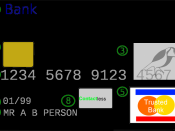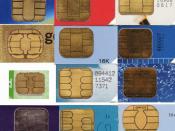SMART CARDS
Introduction
A smart card, a type of chip card, is a plastic card embedded with a computer chip that stores and transacts data between users. This data is associated with either value or information or both and is stored and processed within the card's chip, either a memory or microprocessor. The card data is transacted via a reader that is part of a computing system. Smart card enhanced systems are in use today throughout several key applications, including healthcare, banking, entertainment and transportation. To various degrees, all applications can benefit from the added features and security that smart cards provide.
Applications
First introduced in Europe over a decade ago, smart cards debuted as a stored value tool for pay phones to reduce theft. As smart cards and other chip-based cards advanced, people found new ways to use them, including charge cards for credit purchases and for record keeping in place of paper.
In America, consumers have been using chip cards for everything from visiting libraries to buying groceries to attending movies. There are also chip card programs in progress for government applications ranging from the Department of Motor Vehicles to Electronic Benefit Transfer (EBT). Many industries have implemented the power of smart cards into their products such as the new GSM digital mobile phones to TV satellite decoders.
Why Smart Cards?
Smart cards greatly improve the convenience and security of any transaction. They provide tamper-proof storage of user and account identity. Smart cards also provide vital components of system security for the exchange of data throughout virtually any type of network. They protect against a full range of security threats, from careless storage of user passwords to sophisticated system hacks. Multifunction cards can also serve as network system access and store value and other data. People worldwide are...


